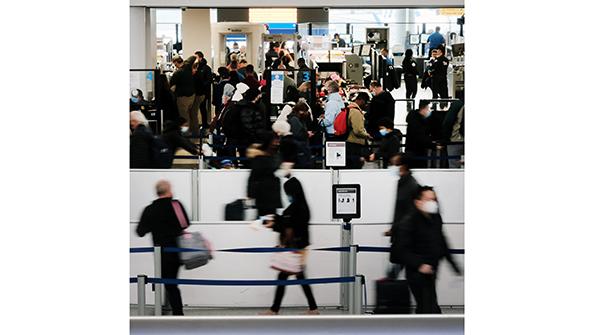Will Omicron Put Brakes On Air Transport’s Recovery?

Since the identification in South Africa of the latest COVID-19 variant, called omicron, scientists have been scrambling for information about its transmissibility, vaccine resistance and symptom severity. There is one certainty, however, which is the shadow of uncertainty the new variant is casting over budding hopes of reopening routes and growing airline activity.
“It’s too soon to judge the health implications, let alone the economic effects, of the emerging omicron COVID variant,” Oxford Economics analysts wrote Nov. 29. “But its rapid spread around the globe and the speedy reimposition of restrictions by governments underscore the bumpiness and unpredictability of the path to normalcy.”
The immediate result of the discovery of the new variant has included numerous border closures, flight bans and tightened rules on areas such as testing.
Among the initial reactions, the European Union moved to deploy its “emergency brake” mechanism to stop travel from the southern African region while some member states also implemented their own restrictions.
The U.S. has taken similar steps, banning entry by foreigners from South Africa and seven nearby countries. The country is also preparing to tighten testing protocols and will soon require all inbound international travelers to present a negative COVID-19 test within one day of departure globally, regardless of nationality or vaccination status.
“This tighter testing timeline provides an added degree of public health protection as scientists continue to assess the omicron variant,” the Biden administration stated.
In Asia, Japan has temporarily banned all foreign visitors, and Australia has frozen its long-awaited plan to reopen borders.
As of Nov. 29, the impact of these changes had not been felt on schedules, according to data specialist OAG. In the week ending Nov. 29, global capacity was down 25.3% compared to the week ending Nov. 25, 2019, at 78.7 million seats, but up 3% week over week.
Adding to the many other omicron unknowns, it is impossible to say at this stage how long those new constraints will last and to what extent, if any, they will affect the progress of the recovery in some important parts of the global network.
Omicron emerged less than a month after the U.S. reopened its borders to vaccinated foreign visitors, a key milestone that had been eagerly awaited by many legacy carriers heavily reliant on transatlantic routes.
“Omicron is most likely to impact transatlantic (14% of passenger revenues) travel, which was 35% recovered in Q3 and was slated to recover to 64% of 2019 levels in Q4,” Jefferies analysts wrote in a Nov. 30 research note.
In Europe, the new restrictions come as traffic reached 77% of 2019 levels in the region in November, according to Eurocontrol figures, in line with the network manager’s recovery scenarios. “[It’s] still not clear how much the new restrictions will impact December,” Eurocontrol Director General Eamonn Brennan said Dec. 1.
UK budget carrier EasyJet said Nov. 30 it was revising downward its capacity estimate for October, November and December to 65% of 2019 levels, compared to a previous estimate of 70%. However, it said bookings were still at good levels for the second half of its financial year, which runs through September and includes the 2022 European summer season, when it expects traffic to be back to near pre-pandemic levels.
“It’s too soon to say what impact omicron may have on European travel and any further short-term restrictions that may result,” the carrier said. “However, we have prepared ourselves for periods of uncertainty such as this.”
In a Nov. 30 interview with Reuters, Emirates Airline President Tim Clark said a major hit to the peak December travel season because of omicron would cause “significant traumas” in the global aviation industry.
Clark acknowledged that the outlook on omicron’s impact would be clearer by the end of December but said that bookings generally remain strong, despite new measures being introduced in some markets. Emirates has halted flights from South Africa and some other countries in the region.
The scramble following the discovery of omicron comes around a year after a similar reaction to the emergence in the UK of the alpha variant. Just before the important holiday travel season in 2020, last-minute changes to travel rules threw passengers’ plans off course, and cases of the variant spread quickly nevertheless.
Fast forward nearly a year, and despite the various travel clampdowns, omicron has already been identified in many countries, including Belgium, Hong Kong, Israel, Italy, the Netherlands, the UK and the U.S.
Airlines have, unsurprisingly, criticized the reimposition of travel restrictions in response to the new variant. “Travel restrictions are not a long-term solution to control COVID variants,” Willie Walsh, director general of the International Air Transport Association, said Nov. 26.
Walsh called for a data-driven approach to the new variant. “Governments are responding to the risks of the new coronavirus variant in emergency mode, causing fear among the traveling public,” he said. “As quickly as possible, we must use the experience of the last two years to move to a coordinated, data-driven approach that finds safe alternatives to border closures and quarantine.”






